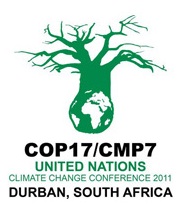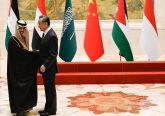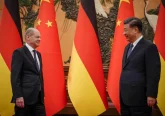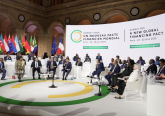 Forthcoming Occasional Paper to be published by the European Union Institute of Security Studies (EU ISS).
Forthcoming Occasional Paper to be published by the European Union Institute of Security Studies (EU ISS).
Author: Pietro De Matteis.
Summary and Policy Recommendations.
This Occasional Paper aims at giving another perspective on the relevance of climate change for the EU’s foreign policy. Considering its linkages with various policy areas such as energy security, economic growth, foreign policy and even political stability, climate change is a major “game-changer” in international relations, and constitute a significant opportunity to reshape the international order according to the new global equilibria. As such, the set up of the climate change regime constitutes for the EU both an opportunity and a threat, in as much as it may either accelerate Europe’s decline as a foreign policy centre or, on the contrary, trigger a new start for its diplomatic ambitions. In this framework, existing institutions are of strategic importance for the EU. On the one hand they can protect the status quo, and with it the privileges that its Member States have gained as the result of WWII and the Cold War. On the other hand, institutions may reinforce the EU’s foreign policy capabilities, allowing it to play an important role within those multilateral frameworks tasked to tackle new global challenges such as climate change. Despite its past successes, however, the EU has increasingly to face the competition of new ‘norm setters’ such as China. Over the past two decades, in fact, the PRC has played an increasingly pivotal role in shaping the climate change regime, on the one hand by influencing the global negotiating strategy and discourse, and, on the other, by building large coalitions in support of its views. It follows that, under the present conditions, to remain relevant in increasingly important policy areas such as climate change, the EU must reinforce its negotiating capacity. To do so means, first of all to strengthen its coalition building discourse. Secondly, to streamline its diplomatic action so to encompass the various areas of shared and exclusive competence (e.g. trade, energy, climate change), and thirdly, to aim at reinforcing the legalisation of those international agreements and institutions that are deemed as capable to protect the EU’s strategic endowment and interests. After having analysed the above mentioned aspects and focused on the role of China in the shaping of the climate change regime, this Occasional Paper gives some suggestions on how the EU may cope with this changing environment, and calls on the EU to draw a ‘European Grand Strategy’ able to put into perspective its challenges and strengths for this first half of the twenty-first century.
Policy Recommendations.
1 ) Gain a deeper understanding of the evolution of the EU’s “strategic endowment” in the medium-long term (e.g. demographic trends, capacity to innovate and protect innovation) and its role on economic and diplomatic influence is of major importance. This should allow the EU to define a “European Grand Strategy” able to successfully manage climate change-related challenges, and to better contribute to the creation of those institutions poised to tackle them.
2) The EU’s role in the creation of the climate change regimes is an important competitive advantage, and must be used as the foundation on which to built its global action in the 21st century. During the negotiations, instead of venturing in the set up of brand new frameworks, the EU should try building on existing ones (e.g. Kyto Protocol, ECT), and strengthen their level of legalisation to better serve its interests.
3) The EU should make an effort to reconcile climate change, energy and trade policies, both at domestic level (e.g. though inter-service consultations) and at international level. A comprehensive solution, is more likely to materialise if all the relevant variables are considered during the negotiations. The Commission should encourage cooperation among DG TRADE, DG ENERGY and DG CLIMA and should not refrain from using its weight on the trade regime to further its agenda on other policy areas. Sectoral approaches are helpful but an overall coherence must be sought, not least through deeper exchanges among existing institutions.
4) By highlighting the “public” nature of climate change the EU should become more aware of the difference between its own strategic interests and the global benefits of its action.
5) A new high level dialogue to discuss a joint vision for the global governance in the area of energy and climate change could be established within the “EU-China Strategic Partnership on Climate Change” in order to improve the EU’s ability to conceive institutional frameworks that are likely to gather the necessary support. The objective of the dialogue should be to produce a Memorandum of Understanding and/or a common position ahead of the various negotiations.
6) As the dynamics that have led to the entry into force of the Kyoto Protocol have demonstrated, the EU must be capable to create coalitions. The EU should look increasingly towards emerging powers and avoid being hold back by the reticence of other industrialised countries. This is for the EU an opportunity to maintain its competitive advantage vis-à-vis other nations when engaging with emerging economies.
Update: The full paper is available here.








No Comment